5:58 PM
[Warning: This is a conference session blog, so please forgive grammar and punctuation mistakes. My comments are in italics]
The keynote session has begun, opened by Benjamin Franklin, who welcomed us all as educators and technologists. While waiting for the program to start, I had a long conversation with Mike Lawrence from the Computer Using Educators, California’s ISTE affiliate and a very fine twice a year (Northern and Southern CA) ed tech conference. Mike mentioned a quote that, the more I think about it, the more sense it makes. He says that conferences are people aggregators. How right that is!
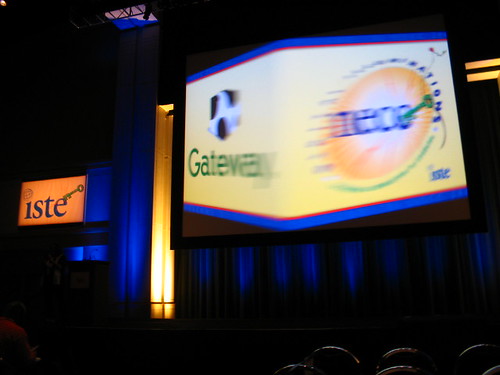 ISTE President, Kurt Steinhaus started the official session with welcomes and some announcements, including mention of a NECC style conference in India. Intriguing. Think about the conversations that come out of that, and I mean that in a new shape of knowledge sort of way. Kurt also made a passionate appeal for advocacy as our government(s) continue to cut out budgets in a time when we need to be investing more heavily in school technology.
ISTE President, Kurt Steinhaus started the official session with welcomes and some announcements, including mention of a NECC style conference in India. Intriguing. Think about the conversations that come out of that, and I mean that in a new shape of knowledge sort of way. Kurt also made a passionate appeal for advocacy as our government(s) continue to cut out budgets in a time when we need to be investing more heavily in school technology.
The Shape of Knowledge
Keynote address by David Weinberger
Weinberger says that the Wikipedia will be what people point to when talking about when the information changed. He referred back to the Wikipedia several times during the presentation. I am still surprised at how few people in many of my audiences are not aware of the Wikipedia. I’m sure that won’t be the case here.
Knowledge began in ancient greece, in the Agora, the open market, where affairs of state were decided. Anyone (white, male, property owners) could stand up and speak. Knowledge it justified, true, belief (Plato).
Nature of Knoweldge
- We assume that there is one knowledge
- Knowledge is neatly organized (a tree of knowledge)
- We need experts to know the knowledge
- Those experts will have power.
This sounds like industrial age schools and too much like the definition of knowledge that we continue to rely on in our education system. ..and perhaps this doesn’t seem as ridiculous to most people as it does to me.
Think of Melvil Dewey, of the dewey decimal system. 88 numbers for christian religion, one for judism, muslem and all related get one number, and budhists go to the right of the decimal place. I guess this is what happens when we treat knowledge/information as objects to be placed neatly in bins, based on a 10 digit grid.
“This is not a solvable problem. There is not one knowledge.” bang!
Four basic principals of organization
- One thing in one place — except in the digital world many things can go in many places.
- Things are neat and clean — except when it’s digital, the more links the better. Messy is good.
- The owners of the information own the organization — except now the customer owns the organization. (it’s an enormous transfer of power)
- Users are passive — except people are not contributing.
One of the mantras of the Wikipedia is that “wiki is not paper”. You know, I think that this could mean a lot of things. What Weinberger went on to was the limiting nature of the traditional encyclopedia, because when it is in print, then the encyclopedia is seen as a container, and a container can hold only so much.
Weinberger says that Britannic consists of 32 volumes and 65,000 topics. Wikipedia consists of more than 600,000 topics and more in other languages.
According to Amazon, Britannica weighs 120 bounds, at 65,000 topics. Assumming all things equal, the Wikipedia at more than 600,000 topics, would weight more than half a ton. Add in the versions in Deutsch, Francais, Nederlands, Portugues, Italiano, Espanol, Plski, Svenska, and 日本語, it would weigh well over one and a quarter tons. But in the digital world, that doesn’t matter.
Weinberger goes on to say that Bloggers are not writing in their diaries. They are people participating in conversations by linking to other peoples ideas and conversations. Every link is a little act of generosity. Very few commercial entities understand that.
Multisubjectivity means lots and lots of viewpoints. but the point is that the viewpoints come from conversations with each other. It’s a paradox that people from varied perspectives converse on common grounds. It’s actually a miracle.
Knowledge as conversation
- Multi-dispute-ism — dispute is trying to get the other person to admit when he is wrong. But in the blogsphere, you disagree, talk about it, and then it’s over. In digital conversations, the dispute is never going to be resolved, and you accept it.
- In the real world, we accept “good enough”. In the web, “good enough” needs to be enough. with 3 million hits on google, you won’t find perfect. Print knowledge looks for what’s perfect.
This is probably the most profound statement in Weinbergers talk as it relates to education. It cuts through to our reluctance to let go of our authority as keepers of the knowledge and allow our children to truly become explorers in the world of information and construct their own knowledge. They need supervision, counciling, and consulting from us. They need us to craft their activities so that their exploration remain relevant to the curriculum expectations. We need to stop teaching students to be students, and start teaching them to be learners, teaching them how to teach themselves.
We have an abundance of information, but it is a connect abundance of information. How true. The connection here, and this plugs in perfectly to part of my literacy model, the problem is not trying to consume all of that information. The problem is managing it, and this requires that we create and cultivate our own digital libraries if content, organizing it in ways that help us do our jobs and pursue our hopes and wishes. This is where librarians come in. They know how to do this. They not how to organize libraries. We need to figure out how to have librarians teach us all what they do, but how to organize personal digital libraries. It’s what our aggregators will become, our personal digital library.
Accountability is accountibalism, eating our young alive! Wow!
Knowledge is conversation, and he means that literally. I’ve been saying this for years, probably ever sense I read Cluetrain
Our job as teachers is to make things more complicated. The world is not that simple. Again, Wow!
There is an epochal struggle going on. One side is afraid. They want there to be one knowledge, one world, one truth, and that it’s simple. OK, I’m going to step way out on a limb here and say that perhaps, and this is just a perhaps, there is a tie between this idea of the one truth and one knowledge, and even one custom, and what is behind our struggle today with “terrorism”. The fundamentalists want the world to remain under control. But that just ain’t so. The world is changing more rapidly than we even understand. As the world of nature adapts, we too must adapt, and this plugs in to what we should be doing as we prepare our children for their future.
The day after 9/11, I tried to write a piece about how it was an attack against what we stand for as professional educators, but I just couldn’t put my finger on it. I think that David Weinberger has. Educators here were liberally and courageously guiding our children into “their” future by creating and crafting engaging and potent learning experiences. …While the fundamentalists want us to go back to a world under control. And folks, the fundamentalists are not just over there. Again, I’m just suggesting something here. I don’t know. Don’t believe me.
 It’s morning, and I’ve finally gotten around to reading yesterday’s USA Today (compliments of Holiday Inn Express). I’m intrigued by the story of a human built space craft crashing into a comet.
It’s morning, and I’ve finally gotten around to reading yesterday’s USA Today (compliments of Holiday Inn Express). I’m intrigued by the story of a human built space craft crashing into a comet.
 Last night will go down as a high point in 2005 NECC. First of all, I went to the
Last night will go down as a high point in 2005 NECC. First of all, I went to the 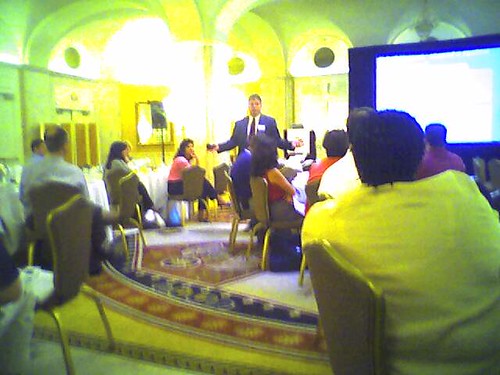 I was lucky enough to be invited to the Intel Breakfast this morning and got to finally listen to Mike Hall, of the Georgia State Department of Education. It seems like Georgia is doing some interesting and bold things, which doesn’t surprise me with Hall at the helm.
I was lucky enough to be invited to the Intel Breakfast this morning and got to finally listen to Mike Hall, of the Georgia State Department of Education. It seems like Georgia is doing some interesting and bold things, which doesn’t surprise me with Hall at the helm. ISTE President, Kurt Steinhaus started the official session with welcomes and some announcements, including mention of a NECC style conference in India. Intriguing. Think about the conversations that come out of that, and I mean that in a new shape of knowledge sort of way. Kurt also made a passionate appeal for advocacy as our government(s) continue to cut out budgets in a time when we need to be investing more heavily in school technology.
ISTE President, Kurt Steinhaus started the official session with welcomes and some announcements, including mention of a NECC style conference in India. Intriguing. Think about the conversations that come out of that, and I mean that in a new shape of knowledge sort of way. Kurt also made a passionate appeal for advocacy as our government(s) continue to cut out budgets in a time when we need to be investing more heavily in school technology.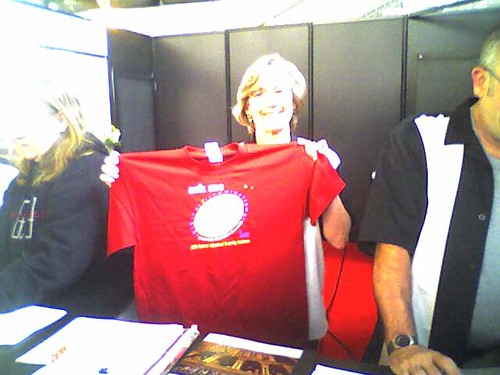 I neglected to mention the friendly and knowledgeable help that I received when I checked-in at the conference registration area. NECC works because of an enormous number of volunteers who are investing their valuable time into making this a valuable event.
I neglected to mention the friendly and knowledgeable help that I received when I checked-in at the conference registration area. NECC works because of an enormous number of volunteers who are investing their valuable time into making this a valuable event.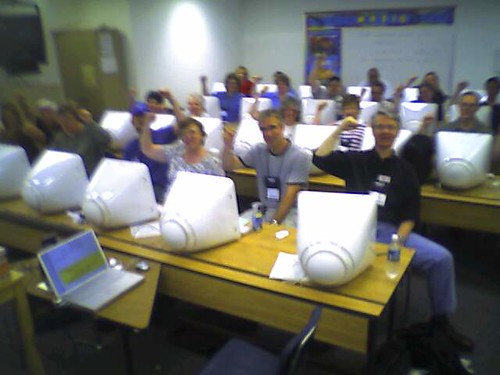 The day is almost over. Teaching a programming class of 30, mostly techno-expert educators, was a demand that I wouldn’t be up to for more than a few days. Teaching a six-hour workshop without the stamina that teachers seem to have on demand is quite a challenge. It reminds me of those days at the beginning of the school year, when after the day was over and you walked into your home, and the only thing you could do is fall into your couch. Teaching can be an exhausting job. My workshop participants were wonderful, and wonderfully patient and understanding when the breakers on the computers in the lab kept breaking, due to the heat in the room.
The day is almost over. Teaching a programming class of 30, mostly techno-expert educators, was a demand that I wouldn’t be up to for more than a few days. Teaching a six-hour workshop without the stamina that teachers seem to have on demand is quite a challenge. It reminds me of those days at the beginning of the school year, when after the day was over and you walked into your home, and the only thing you could do is fall into your couch. Teaching can be an exhausting job. My workshop participants were wonderful, and wonderfully patient and understanding when the breakers on the computers in the lab kept breaking, due to the heat in the room. 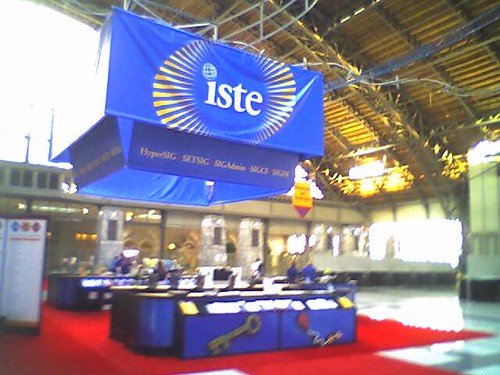 I’ve already run into some friends. Number one, Holly Job, the director of technology at the
I’ve already run into some friends. Number one, Holly Job, the director of technology at the